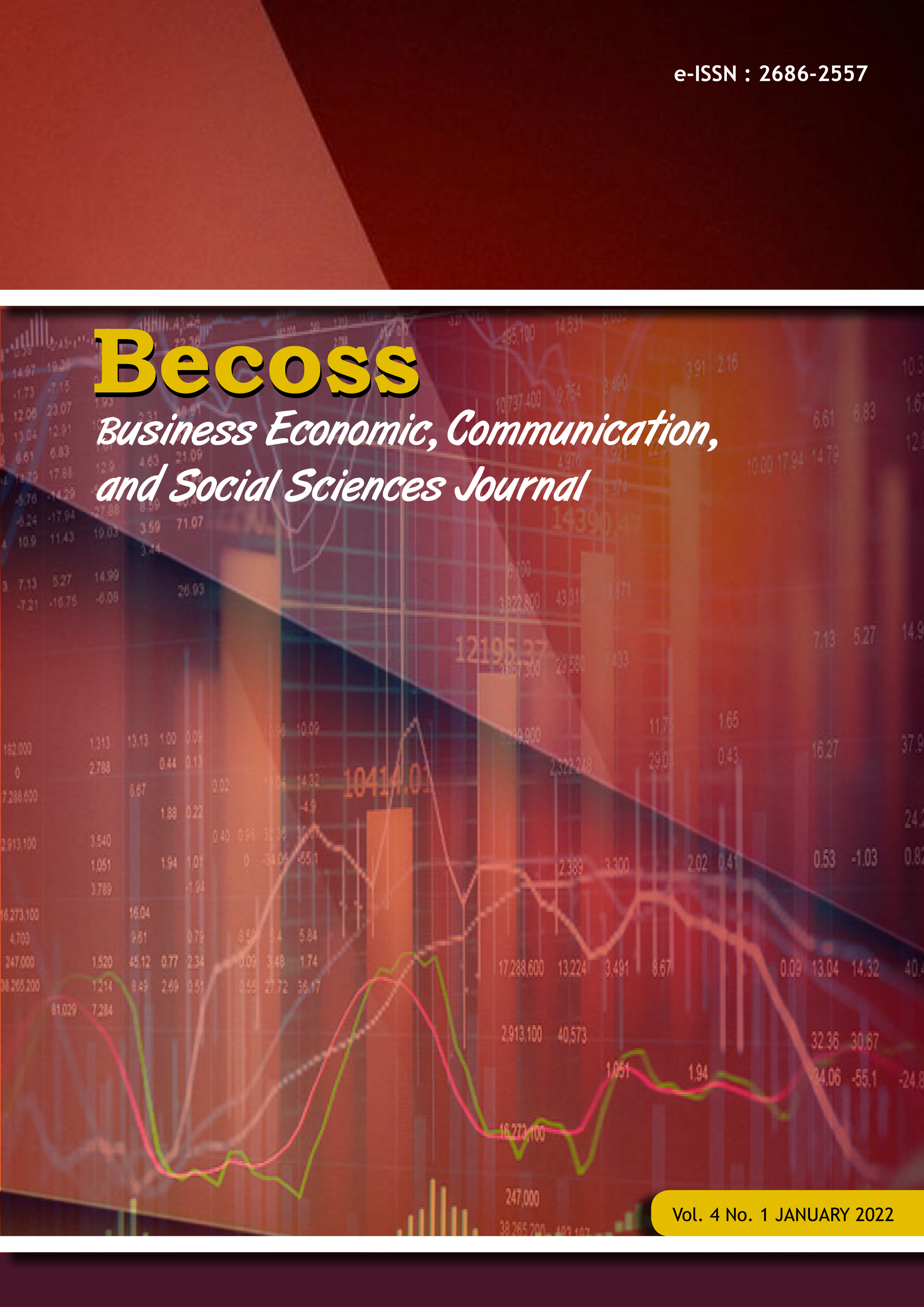Analysis of the Effect of Gender, High School Origin, Middle School Department, College Motivation on Academic Achievement of Students of Accounting and Finance Department: Case Study on One of Private University in Indonesia
DOI:
https://doi.org/10.21512/becossjournal.v4i1.7784Keywords:
Academic Achievements, Gender, High School Origin, High School Programs, College Motivation, Accounting EducationAbstract
This research aims to know the learning patterns and student’s abilities in education performance by identify and analyze the influence of gender, the high school origin, high school programs, motivation on academic achievement. The methods of data collection are carried out through the following methods of questionnaires, literature studies. This study is quantitative explanatory and retrieves important accounting items. Based on the data analysis was conducted, the results showed that gender, high school programs, college motivation are not significantly affected in the GPA While the origin of high school significantly affects the GPA. This study suggested that future studies adopt other methods of data analysis and take the dependent variable other than academic achievement.
References
Albretch. W, Sack R (2000). Accounting Education: Charting the Course through Perilous Future. USA: American Accounting Association
Aryati & Imran. (2014). Faktor-faktor yang Mempengaruhi Prestasi Belajar Mahasiswa pada kelompok Mata Kuliah Keahlian Akuntansi. Jurnal Siwalima 13-22.
Creswell, J. W. (2007). Research Design: Qualitative, Quantitative and Mixed Method Aproaches. SAGE Publications. https://doi.org/10.4135/9781849208956
Frey, C. B., & Osborne, M. A. (2017). The future of employment: How susceptible are jobs to computerisation? Technological Forecasting and Social Change. https://doi.org/10.1016/j.techfore.2016.08.019
Ghozali, I. (2012). Aplikasi Analisis Multivariate Dengan Program IBM SPSS 20. Edisi 6
Hanafi, M. A. O., & Fadilah, P. (2017). Quantitative Data Analysis: Choosing Between SPSS, PLS and AMOS in Social Science Research. International Interdisciplinary Journal of Scientific Research, 3(1), 14–25.
Lalima, D., & Lata Dangwal, K. (2017). Blended Learning: An Innovative Approach. Universal Journal of Educational Research. https://doi.org/10.13189/ujer.2017.050116
Lee, J., Lim, C., & Kim, H. (2017). Development of an instructional design model for flipped learning in higher education. Educational Technology Research and Development. https://doi.org/10.1007/s11423-016-9502-1
Octaryani, M., & Baidun, A. (2018). Uji Validitas Konstruk Resiliensi. Jurnal Pengukuran Psikologi Dan Pendidikan Indonesia (JP3I). https://doi.org/10.15408/jp3i.v6i1.8150
Priatna, B. A. (2008). Instrumen penelitian. Jurnal Pendidikan Matematika.
Raguseo, E. (2018). Big data technologies: An empirical investigation on their adoption, benefits and risks for companies. International Journal of Information Management, 38(1), 187–195. https://doi.org/10.1016/j.ijinfomgt.2017.07.008
Rezaee, Z., & Wang, J. (2019). Relevance of big data to forensic accounting practice and education. Managerial Auditing Journal. https://doi.org/10.1108/MAJ-08-2017-1633
Robbins, Stephen T.A (2013). Organizational Behavior. USA : Pearson
Santrock J.W. (2009). Psikologi Pendidikan. Edisi 3 Buku 1. (D.Angelica Trans). Jakarta: Salemba Humanika
Santrock, J.W. (2011). Educational Psychology. NewYork :McGraw-Hill
Sarjono, H. Julianita (2011). SPSS vs Lisrel. Jakarta: Salemba Empat
Sekaran, R.B (2013).Research and Methods for Business. United Kingdom : WILEY
Sorescu, A. (2017). Data-Driven Business Model Innovation. Journal of Product Innovation Management. https://doi.org/10.1111/jpim.12398
Sugiyono. (2015). Metode Penelitian Pendidikan. Bandung. In Metode Penelitian Pendidikan (Pendekatan Kuantitatif, Kualitatif, dan R&D).
Weygandt Jerry, Kimmel Paul, Kieso Don. (2011). Financial Accounting IFRS Edition. United Stated: John Wiley & Sons, Inc.
Downloads
Published
How to Cite
Issue
Section
License
Copyright (c) 2022 Business Economic, Communication, and Social Sciences (BECOSS) Journal

This work is licensed under a Creative Commons Attribution-ShareAlike 4.0 International License.
Authors who publish with this journal agree to the following terms:
- Authors retain copyright and grant the journal right of first publication with the work simultaneously licensed under a Creative Commons Attribution License - Share Alike that allows others to share the work with an acknowledgment of the work's authorship and initial publication in this journal.
- Authors are able to enter into separate, additional contractual arrangements for the non-exclusive distribution of the journal's published version of the work (e.g., post it to an institutional repository or publish it in a book), with an acknowledgment of its initial publication in this journal.
- Authors are permitted and encouraged to post their work online (e.g., in institutional repositories or on their website) prior to and during the submission process, as it can lead to productive exchanges, as well as earlier and greater citation of published work.
USER RIGHTS
All articles published Open Access will be immediately and permanently free for everyone to read and download. We are continuously working with our author communities to select the best choice of license options, currently being defined for this journal as follows: Creative Commons Attribution-Share Alike (CC BY-SA)






